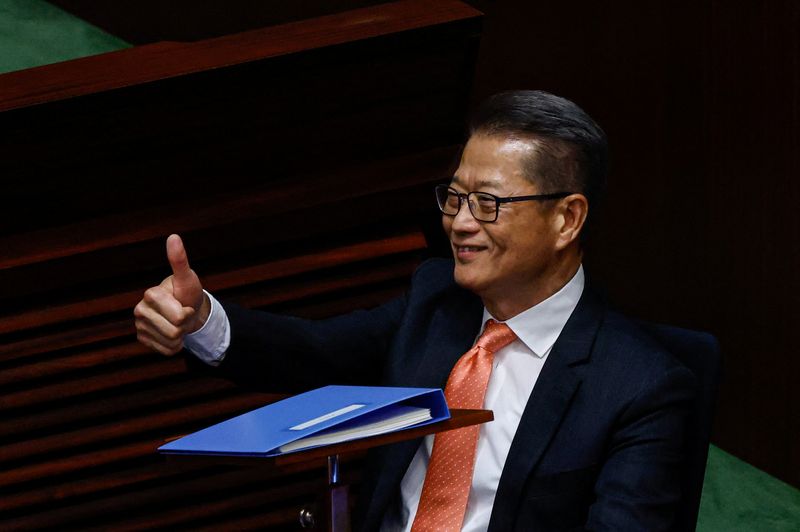Select Language

By Clare Jim and James Pomfret
HONG KONG (Reuters) -Hong Kong's financial secretary on Wednesday announced major measures to bolster the city's flagging property market by scrapping most stamp duties on transactions, with the city economy expected to grow a modest 2.5%-3.5% this year.
The financial hub that expanded 3.2% in 2023, will cancel all buy-side property tightening measures for residential properties and waive stamp duties payable on the transfer of REIT units, Paul Chan told lawmakers in his annual budget.
Noting challenges including high interest rates, a complex geopolitical environment as well as ballooning recent budget deficits, Chan announced a mix of measures spanning property, tourism and financial services to lure back capital, businesses and visitors to the city, as well as restore fiscal balance.
On property, long a key pillar of the economy, Chan said all demand-side management measures for residential properties would be scrapped with immediate effect.
"We consider that the relevant measures are no longer necessary amidst the current economic and market conditions," Chan said, adding that there was room to further tweak measures for the real estate sector.
These include cutting all additional stamp duties for foreign buyers and those for the purchase of second properties, that had been imposed in the decade prior to the current slump to try to cool one of the world's priciest property markets.
Hong Kong's housing prices have plunged 20% since their 2021 peak given both economic and political headwinds, including a national security clampdown that stoked an emigration wave from the city and a slowing Chinese economy impacting potential Chinese home buyers - long a driver of the market.
Hong Kong's stock market property sub-index was up just over 2% on the news, before paring back some gains.
"It is believed that in the short term, it will stimulate the trading volume, promote the recovery of the property market, restore market confidence, and stabilize property prices," said Wang Zhaoqi, the head of research for property firm Knight Frank.
The government will roll out more than HK$1 billion ($127 million) in support measures for its beleaguered tourism industry, to help offset the impact from the struggling Chinese economy, which has resulted in fewer visitors from the mainland.
The city will stage more than 80 "mega events" in the first half of the year to boost tourism, including a monthly fireworks and drone show at its famed Victoria Harbour.
On Hong Kong's ballooning fiscal deficits, with the city running up deficits for four of the past five years, Chan pledged to "adopt a fiscal consolidation strategy to narrow our fiscal deficit progressively towards achieving the goal of restoring fiscal balance," though he didn't specify a timeframe.
In fiscal 2022/23 Hong Kong posted a budget deficit of HK$122.3 billion ($15.63 billion) after taking into account the proceeds of HK$66 billion received from issuance of green bonds.
Economic growth has also been hampered by geopolitical tensions between China and the United States, while capital flight turned the Hong Kong stock market into the worst performing major index last year.
($1 = 7.8260 Hong Kong dollars)

